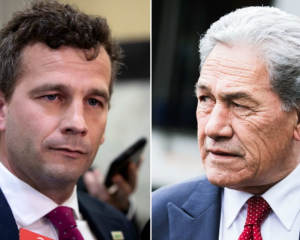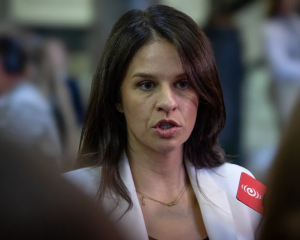Ignore the Reserve Bank's warning that the Auckland housing ''bubble'' is about to burst.
Stop trying to picture the Greens without Russel Norman.
Don't fret about the safety of our soldiers when they eventually head for Iraq.
It truly beggars belief, but when it comes to assessing what is the most pressing issue or matter dominating New Zealand politics right now, a visitor from Mars, observing the copious amount of coverage of the subject, would have to pick the current frenzy which has the media and some Opposition politicians pointing the finger at John Key and demanding he reveal exactly when he was first told of the ''personal issues'' which prompted one of his lesser-known MPs to suddenly resign from Parliament a week or so ago.
One word adequately describes this latest instalment in Mr Key's enemies' long-running fixation with typecasting the Prime Minister as being nothing more than a money merchant turned political huckster who, at times, enjoys a strange and somewhat strained relationship with the truth.
That word is pathetic.
Sure, on occasions Mr Key's behaviour has resulted in him falling well short of being Saint John.
In some of these cases, he has been his own worst enemy, putting his credibility at risk by claiming he was unaware of things which the Prime Minister would be expected to know about.
And then there have been the sudden memory lapses ... His unwillingness to take responsibility for the dirty tricks campaign run out of his Beehive office should have seen him punished by having to spend 40 days and 40 nights in the wilderness over the summer rather than retreating to his holiday home in Hawaii.
However, Mr Key is not the only one who could usefully take a lesson from Nicky Hager's Dirty Politics.
It is a lesson Labour and other Opposition parties seem reluctant to take on board: pick your fights with Mr Key very, very carefully.
Given the centre-left was well and truly thrashed by John Key-led National in last September's election - not to mention the two previous ones - you would have thought it would have dawned on those occupying that part of the political spectrum that devoting time and energy to catching the Prime Minister out has not been very productive.
If anything, it seems to be counterproductive, reinforcing Mr Key's standing, rather than undermining it.
That Mr Key escaped punishment at the ballot box last September despite exposure of the dirty-tricks campaign masterminded by Jason Ede and Whale Oil's Cameron Slater tells you an awful lot about New Zealand voters' stance on the abuse of power and safeguarding political rights.
Quite simply, they don't have one.
If they did, Mr Hager would have been considered a hero - not someone to be vilified and who ends up on the receiving end of a police search warrant.
Such high levels of public apathy have given Mr Key a reliable measure of the degree of public tolerance of his and National's less attractive attributes.
In the case of Mike Sabin and allegations made against him which ultimately forced the Northland MP's resignation from Parliament, Mr Key's popularity is such that he could probably change his story half-a-dozen times while now admitting he was well aware of Mr Sabin's troubles long before last September's election and the backbencher's appointment as chairman of Parliament's law and order select committee.
That Mr Key gets away with things that trip up other (and lesser) politicians is a source of immense frustration for the centre-left.
It is one reason why Mr Key is not just disliked by Labour activists. He is detested. Finding the means of destroying his seemingly hypnotic hold on Middle New Zealand has become an obsession for Labour.
Cue Labour's revival of the old game of ''what did the Prime Minister really know and when did he know it?''
Given the chatter within National Party ranks and elsewhere in the months before the September election, plus reports that a police investigation began in August, it seems inconceivable Mr Key did not know of Mr Sabin's problems before late November - the time Mr Key says he was informed.
Everyone else seems to have known before then.
There is also a strong possibility police tipped off the Beehive under a ''no surprises'' policy alerting party leaders when an MP strikes trouble of a legal nature.
But so what?
Mr Key might be skating on very thin ice, but no-one has come up with a jot of evidence to suggest he knew about Mr Sabin's troubles much earlier.
The only slight embarrassment for Mr Key is that he has had to concede that a phone call between Wayne Eagleson, Mr Key's chief of staff and Eagleson's Labour counterpart, Matt McCarten, on the topic of Mr Sabin happened a week earlier than Mr Key initially claimed.
Big deal. Andrew Little might have ben tempted to have pointed to this as a minor victory over Mr Key. Most people will not have given a tinker's cuss.
They will have only been further persuaded that Labour is wedged firmly in the realm of the trivial.
As it is, the Labour leader called Mr Key a liar - a sign he thinks he must confront him on the strongest possible terms.
Mr Key expressed disappointment that Mr Little was going down the same path as other Labour leaders in choosing to resort to personal denigration.
Mr Key's ''disappointment'' was actually delight. In calling Mr Key a liar, Mr Little had effectively vacated the moral high ground.
Mr Little realised he had gone too far and refused to repeat the accusation when questioned subsequently.
However, strong language is perfectly in order. The Sabin affair has crossed a line between the faintly ridiculous to the utterly ludicrous.
The paucity of information has wiser heads withholding judgement on Mr Key's handling of the matter.
Mr Key's opponents have instead seized what might have seemed an opportunity to castigate him which was never there in fact.
They have allowed themselves to be dragged into a dead-end street by the seductive siren calls of the media whose threshold for news is at a silly-season low and whose appetite for politics is determined more and more by its capacity to be a blood sport.
• John Armstrong is The New Zealand Herald political correspondent.













